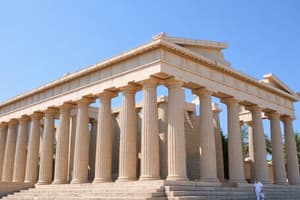Podcast
Questions and Answers
What was a significant characteristic of Greek sculpture?
What was a significant characteristic of Greek sculpture?
- It primarily focused on mythological creatures.
- It used only geometric shapes to represent figures.
- It was abstract and non-representational.
- It emphasized lifelike details and anatomy. (correct)
What influenced Greek architectural design?
What influenced Greek architectural design?
- The elaborate designs of Nordic cultures.
- The use of wooden materials by Celtic tribes.
- The monumental structures built by Egyptians. (correct)
- The emphasis on minimalism in Asian architecture.
What was the first wave of the spread of Greek culture primarily driven by?
What was the first wave of the spread of Greek culture primarily driven by?
- Trade relations with the Phoenicians.
- Military conquests by Alexander the Great.
- Population growth leading to food shortages. (correct)
- Cultural exchanges with the Romans.
What term did the Greeks use to refer to people whose cultures they considered inferior?
What term did the Greeks use to refer to people whose cultures they considered inferior?
Which statement best describes the Greeks' view of their culture compared to others?
Which statement best describes the Greeks' view of their culture compared to others?
Why is Greek culture considered more influential than that of the Persians and Egyptians?
Why is Greek culture considered more influential than that of the Persians and Egyptians?
What happened to Egyptian writing after the rise of Greek culture?
What happened to Egyptian writing after the rise of Greek culture?
What significant event contributed to the second wave of Greek cultural spread?
What significant event contributed to the second wave of Greek cultural spread?
Flashcards
Greek Sculpture Realism
Greek Sculpture Realism
Greek sculptors achieved incredible realism in their art, focusing on detailed anatomical accuracy, unlike other cultures of the time.
Greek Cultural Superiority
Greek Cultural Superiority
The Greeks believed that their culture was superior to others, often referring to foreign cultures as 'barbarian,' reflecting their arrogant view.
Hellenistic Spread of Greek Culture
Hellenistic Spread of Greek Culture
The Hellenistic period, marked by Alexander the Great's conquests, witnessed the rapid spread of Greek culture across various parts of the known world.
Greek Architectural Influence
Greek Architectural Influence
Signup and view all the flashcards
Renaissance & Greek Influence
Renaissance & Greek Influence
Signup and view all the flashcards
Greek Architectural Balance
Greek Architectural Balance
Signup and view all the flashcards
Waves of Greek Cultural Diffusion
Waves of Greek Cultural Diffusion
Signup and view all the flashcards
Impact of Greek Culture
Impact of Greek Culture
Signup and view all the flashcards
Study Notes
Greek Art and Architecture
- Greek art, particularly sculpture, was highly realistic, portraying gods and humans with lifelike detail.
- Sculptors meticulously studied the human form—muscles, faces, and proportions—to achieve accuracy.
- Greek sculptors likely drew inspiration from surrounding cultures, including Egypt.
- Greek temples, incorporating columns, were innovative adaptations of earlier Egyptian designs with a concern for balance in their proportions.
Spread of Greek Culture
- Initially confined to a limited region (modern Greece and western Turkey), Greek culture expanded across significant parts of the ancient world.
- This expansion occurred in two distinct waves.
- First Wave (8th-7th centuries BC): Driven by population growth and food shortages, Greeks migrated and established colonies.
- Second Wave (following Alexander the Great's conquests, 330 BC): Alexander's vast conquests of Asia and Egypt led to the spread of Greek culture.
- While Alexander sometimes permitted local customs, Greek culture was generally seen as superior to others.
- The term "barbarian" was used to demean cultures perceived as less sophisticated by the Greeks.
Influence of Greek Culture
- Greek culture is considered more significant than other ancient cultures (e.g., Persian, Egyptian) for several reasons:
- Unique Greek philosophical and intellectual achievements were not replicated by other ancient cultures like those of Persians or Egypt.
- Egyptian and similar records have been mostly lost to time; Greek culture had a larger impact on later civilizations, leaving behind more records and influencing future cultures.
- Greece held high cultural prestige in Europe, largely due to the Romans' admiration for Greek culture. Modern understanding of "classical culture" often intertwines Greek and Roman achievements.
- Arab scholars preserved and disseminated Greek knowledge further contributing to its lasting influence.
Studying That Suits You
Use AI to generate personalized quizzes and flashcards to suit your learning preferences.




